- Home
- Nick Hornby
Ten Years in the Tub: A Decade Soaking in Great Books Page 6
Ten Years in the Tub: A Decade Soaking in Great Books Read online
Page 6
Five or six years ago, a friend in Philly introduced me to a local band called Marah. Their first album had just come out, on an indie label, and it sounded great to me, like the Pogues reimagined by the E Street Band, full of fire and tunes and soul and banjos. There was a buzz about it, and they got picked up by Steve Earle’s label E-Squared; their next album got noticed by Greil Marcus and Stephen King (who proudly wore a Marah T-shirt in a photo-shoot) and Springsteen himself, and it looked like they were off and away. Writing this down, I can suddenly see the reason why it didn’t happen for them, or at least, why it hasn’t happened yet. Steve Earle, Stephen King, Greil Marcus, Bruce, me… none of us is under a hundred years old. The band is young, but their referents, the music they love, is getting on a bit, and in an attempt to address this problem, they attempted to alienate their ancient fans with a noisy modern rock album. They succeeded in the alienation, but not in finding a new audience, so they have been forced to retreat and retrench and rethink. At the end of the Fiddler’s Elbow show they passed a hat around, which gives you some indication of the level of retrenchment going on. They’ll be OK. Their next album will be spectacular, and they’ll sell out Madison Square Garden, and you’ll all be boasting that you read a column by a guy who saw them in the Fiddler’s Elbow.
Anyway, the two shows I saw that week were spectacular, as good as anything I’ve seen with the possible exception of the Clash in ’79, Prince in ’85, and Springsteen on the River tour. Dave and Serge, the two brothers who are to Marah what the Gallaghers are to Oasis, played the Fiddler’s Elbow as if it were Giants Stadium, and even though it was acoustic, they just about blew the place up. They were standing on chairs and lying on the floor, they were funny, they charmed everyone in the pub apart from an old drunk sitting next to the drum kit (a drummer turned up halfway through the evening with his own set, having played a gig elsewhere first), who put his fingers firmly in his ears during Serge’s extended harmonica solo. (His mate, meanwhile, rose unsteadily to his feet and started clapping along.) It was utterly bizarre and very moving: most musicians wouldn’t have bothered turning up, let alone almost killing themselves. And I was reminded—and this happened the last time I saw them play, too—how rarely one feels included in a live show. Usually you watch, and listen, and drift off, and the band plays well or doesn’t and it doesn’t matter much either way. It can actually be a very lonely experience. But I felt a part of the music, and a part of the people I’d gone with, and, to cut this short before the encores, I didn’t want to read for about a fortnight afterwards. I wanted to write, but I couldn’t because of the holidays, and I wanted to listen to Marah, but I didn’t want to read no book. I was too itchy, too energized, and if young people feel like that every night of the week, then, yes, literature’s dead as a dodo. (In an attempt to get myself back on course, I bought Bill Ehrhardt’s book Vietnam-Perkasie, because he comes Marah-endorsed, and provided the inspiration for “Round Eye Blues,” one of their very best songs. I didn’t read the thing, though. And their next album is tentatively entitled 20,000 Streets under the Sky, after a Patrick Hamilton novel—I’m going to order that and not read it, too.)
It wasn’t as if I didn’t try; it was just that very little I picked up fit very well with my mood. I bought Flaubert’s letters after reading the piece about Donald Barthelme’s required reading list in the Believer [October, 2003], but they weren’t right—or at least, they’re not if one chooses to read them in chronological order. The young Flaubert wasn’t very rock and roll. He was, on this evidence, kind of a prissy, nerdy kid. “friend, I shall send you some of my political speeches, liberal constitutionalist variety,” he wrote to Ernest Chevalier in January 1831; he’d just turned nine years old. Nine! Get a life, kid! (Really? You wrote those? They’re pretty good books. Well… Get another one, then.) I am probably taking more pleasure than is seemly in his failure to begin the sentence with a capital letter. You know, as in, Jesus, he didn’t know the first thing about basic punctuation! How did this loser ever get to be a writer?
Francis Wheen’s How Mumbo-Jumbo Conquered the World was a better fit, because, well, it rocks: it’s fast and smart and very funny, despite being about how we have betrayed the Enlightenment by retreating back to the Dark Ages. Wheen wrote a warm, witty biography of Marx a few years back, and has a unique, sharp, enviable, and trustworthy mind. Here he dishes it out two-fisted to Tony Blair and George W. Bush, Deepak Chopra and Francis Fukuyama, Princess Diana and Margaret Thatcher, Hillary Clinton and Jacques Derrida, and by the end of the book you do have the rather dizzying sensation that you, the author, and maybe Richard Dawkins are the only remotely sane people in the entire world. It’s difficult to endorse this book without committing a few cardinal Believer sins: as you may have noticed, some of the people that Wheen accuses of talking bullshit are, regrettably, writers, and in a chapter entitled “The Demolition Merchants of Reality,” Wheen lumps deconstructionism in with creationism. In other words, he claims there isn’t much to choose from between Pat Buchanan and Jacques Lacan when it comes to mumbo-jumbo, and I’m sorry to say that I laughed a lot. The next chapter, “The Catastrophists,” gives homeopathy, astrology, and UFOlogy a good kicking, and you’ll find yourself conveniently forgetting the month you gave up coffee and mint because you were taking arnica three times a day. (Did you know that Jacques Benveniste, one of the world’s leading homeopathic “scientists,” now claims that you can email homeopathic remedies? Yeah, see, what you do is you can take the “memory” of the diluted substance out of the water electromagnetically, put it on your computer, email it, and play it back on a sound card into new water. I mean, that could work, right?)
Richard Dawkins, Wheen recalls, once pointed out that if an alternative remedy proves to be efficacious—that is to say, if it is shown to have curative properties in rigorous medical trials—then “it ceases to be an alternative; it simply becomes medicine.” In other words, it’s only “alternative” so long as it’s been shown not to be any bloody good. I found it impossible not to apply this helpful observation to other areas of life. Maybe a literary novel is just a novel that doesn’t really work, and an art film merely a film that people don’t want to see… How Mumbo-Jumbo Conquered the World is a clever-clogs companion to Michael Moore’s Stupid White Men; and as it’s about people of both sexes and every conceivable hue, it’s arguably even more ambitious.
I read Liar’s Poker, Michael Lewis’s book about bond-traders in the eighties, for two reasons, one of which was Wheen-inspired: he made me want to try and be more clever, especially about grown-up things like economics. Plus I’d read Lewis’s great Moneyball a couple of months previously [see “Stuff I’ve Been Reading,” Dec. 2003/Jan. 2004], so I already knew that he was capable of leading me through the minefields of my own ignorance. It turns out, though, that the international money markets are more complicated than baseball. These guys buy and sell mortgages! They buy and sell risk! But I haven’t got a clue what any of that actually means! This isn’t Michael Lewis’s fault—he really did try his best, and in any case you kind of romp through the book anyway: the people are pretty compelling, if completely unlike anyone you might meet in real life. At one point, Lewis describes an older trader throwing a ten-dollar bill at a young colleague about to take a business flight. “Hey, take out some crash insurance for yourself in my name,” the older guy says. “I feel lucky.” As a metaphor for what happens on the trading floor, that’s pretty hard to beat.
Francis Wheen’s book and Paul Collins’s Not Even Wrong were advance reading copies that arrived through the post. I’m never going to complain about receiving free early copies of books, because quite clearly there’s nothing to complain about, but it does introduce a rogue element into one’s otherwise carefully plotted reading schedule. I had no idea I wanted to read Wheen’s book until it arrived, and it was because of Wheen that I read Lewis, and then Not Even Wrong turned up and I wanted to read that too, and Buchan’s Greenmantle got put to one side, I s
uspect forever. Being a reader is sort of like being president, except reading involves fewer state dinners, usually. You have this agenda you want to get through, but you get distracted by life events, e.g. books arriving in the mail/World War III, and you are temporarily deflected from your chosen path.
Having said that I hardly ever read books about autism. I have now read two in the last few weeks. Paul Collins, occasionally of this parish, is another parent of an autistic kid, and Not Even Wrong, like Charlotte Moore’s George and Sam, is a memoir of sorts. The two books are complementary, though; while writing unsentimentally but movingly about his son Morgan’s diagnosis and the family’s response, Collins trawls around, as is his wont, for historical and contemporary illustration and resonance, and finds plenty. There’s Peter the Wild Boy, who became part of the royal household in the early eighteenth century, and who met Pope, Addison, Steele, Swift, and Defoe—he almost certainly played for our team. (Autistic United? Maybe Autistic Wanderers is better.) And Collins finds a lot of familiar traits among railway-timetable collectors, and Microsoft boffins, and outsider artists… I’m happy that we’re living through these times of exceptionally written and imaginative memoirs, despite the incessant whine you hear from the books pages; Collins’s engaging, discursive book isn’t as raw as some, but in place of rawness there is thoughtfulness, and thoughtfulness is never a bad thing. I even learned stuff, and you can’t often say that of a memoir.
New Year, New Me, another quick read of Gillian Riley’s How to Give Up Smoking and Stay Stopped for Good. I have now come to think of Riley as our leading cessation theorist; she’s brilliant, but now I need someone who deals with the practicalities.
April 2004
BOOKS BOUGHT:
Hangover Square—Patrick Hamilton
The Long Firm—Jake Arnott
American Sucker—David Denby
BOOKS READ:
Hangover Square—Patrick Hamilton
The Long Firm—Jake Arnott
The Curious Incident of the Dog in the Night-Time—Mark Haddon
True Notebooks—Mark Salzman
Last month I was banging on about how books were better than anything—how just about any decent book you picked would beat up anything else, any film or painting or piece of music, you cared to match it up with. Anyway, like most theories advanced in this column, it turned out to be utter rubbish. I read four really good books this month, but even so, my cultural highlights of the last four weeks were not literary. I went to a couple of terrific exhibitions at the Royal Academy (and that’s a hole in my argument right there—one book might beat up one painting, but what chance has one book, or even four books, got against the collected works of Guston and Vuillard?); I saw Jose Antonio Reyes score his first goal for Arsenal against Chelsea, a thirty-yard screamer, right in the top corner; and someone sent me a superlative Springsteen bootleg, a ’75 show at the Main Point in Bryn Mawr with strings, and a cover of “I Want You,” and I don’t know what else. Like I said, I loved the books that I read this month, but when that Reyes shot hit the back of the net, I was four feet in the air. (The Polysyllabic Spree hates sport, especially soccer, because it requires people to expose their arms and legs, and the Spree believes that all body parts must be covered at all times. So even though I’m not allowed to talk about Reyes at any length, he does look to be some player.) Anyway, Patrick Hamilton didn’t even get me to move my feet. I just sat there—lay there, most of the time—throughout the whole thing. So there we are, then. Books: pretty good, but not as good as other stuff, like goals, or bootlegs.
I spent a long time resisting The Curious Incident of the Dog in the Night-Time because I got sent about fifteen copies, by publishers and agents and magazines and newspapers, and it made me recalcitrant and reluctant, truculent, maybe even perverse. I got sent fifteen copies because the narrator of The Curious Incident has Asperger’s syndrome, which places him on the autistic spectrum, although way over the other side from my son. I can see why publishers do this, but the books that arrive in the post tend to be a distorted and somewhat unappetizing version of one’s life and work. And what one wants to read, most of the time, is something that bears no reference to one’s life and work.
(Twice this week I have been sent manuscripts of books that remind their editors, according to their covering letters, of my writing. Like a lot of writers, I can’t really stand my own writing, in the same way that I don’t really like my own cooking. And, just as when I go out to eat, I tend not to order my signature dish—an overcooked and overspiced meat-stewy thing containing something inappropriate, like tinned peaches, and a side order of undercooked and flavorless vegetables—I really don’t want to read anything that I could have come up with at my own computer. What I produce on my computer invariably turns out to be an equivalent of the undercooked overcooked stewy thing, no matter how hard I try to follow the recipe, and you really don’t want to eat too much of that. I’d love to be sent a book with an accompanying letter that said, “This is nothing like your work. But as a man of taste and discernment, we think you’ll love it anyway.” That never happens.)
Anyway, I finally succumbed to Mark Haddon’s book, simply because it had been recommended to me so many times as a piece of fiction, rather than as a recognizable portrait of my home life. It’s the third book about autism I’ve read in three months, and each book—this one, Charlotte Moore’s George and Sam, and Paul Collins’s Not Even Wrong—contains a description of the classic test devised to demonstrate the lack of a theory of mind in autistic children. I’ll quote Paul Collins’s succinct summary:
Sally and Anne have a box and a basket in front of them. Sally puts a marble in the basket. Then she leaves the room. While Sally is gone, Anne takes the marble out of the basket and puts it in the box. When Sally comes back in, where will she look for her marble?
If you ask ordinary kids, even ordinary three-year-olds, to observe Sally and Anne and then answer the question, they’ll tell you that Sally will look in the basket. An autistic kid, however, will always tell you that Sally should look in the box, because an autistic kid is unable to imagine that someone else knows (or feels, or thinks) anything different from himself. In The Curious Incident, Christopher attempts to solve a murder-mystery, and one would imagine that of all the career-paths closed off to autists, the path leading to a desk at the FBI is probably the least accessible. If you are profoundly unable to put yourself in someone else’s shoes, then a job involving intuition and empathy, second-guessing and psychology is probably not the job for you. Haddon has Christopher, his narrator, refer to the theory-of-mind experiment, and it’s the one moment in the book where the author nearly brings his otherwise smartly imagined world crashing about his and our ears. Christopher talks about his own failure in the test, and then says, “That was because when I was little I didn’t understand about other people having minds. And Julie said to Mother and Father that I would always find this very difficult. Because I decided it was a kind of puzzle, and if something is a puzzle there is always a way of solving it.”
“I decided it was a kind of puzzle…” Hold on a moment: that means—what?—that every Asperger’s kid could do this, if they so chose? That the most debilitating part of the condition—effectively, the condition itself—could be removed by an application of will? This is dangerous territory, and I’m not sure Haddon crosses it with absolute conviction. The Curious Incident… is an absorbing, entertaining, moving book, but when truth gets bent out of shape in this way in order to serve the purposes of a narrative, then maybe it’s a book that can’t properly be described as a work of art? I don’t know. I’m just asking the question. Happily, the detective element of the novel has been pretty much forgotten by the second half, and one description—of Christopher trying and failing to get on a crowded tube train, and then another, and then another, until hours and hours pass—is unforgettable, and very, very real.
In an online interview, Haddon quotes one of his Amazon reviewers, someon
e who hated his novel, saying “the most worrying thing about the book is that Christopher says he dislikes fiction, and yet the whole book is fiction.” And that, says the author, “puts at least part of the problem in a nutshell.” It doesn’t, I don’t think, because the Amazon reviewer is too dim to put anything in a nutshell. I suspect, in fact, that the Amazon reviewer couldn’t put anything in the boot of his car, let alone a nutshell. (Presumably you couldn’t write a book about someone who couldn’t read, either, or someone who didn’t like paper, because the whole book is paper. Oh, man, I hate Amazon reviewers. Even the nice ones, who say nice things. They’re bastards too.) But Haddon is right if what he’s saying is that picking through a book of this kind for inconsistencies is a mug’s game, and I’m sorry if that’s what I’ve done. The part that made me wince a little seemed more fundamental than an inconsistency, though.
This comes up again in Patrick Hamilton’s brilliant Hangover Square, where the central character suffers from some kind of schizophrenia. At periodic intervals he kind of blacks out, even though he remains conscious throughout the attacks. (“It was as though a shutter had fallen”; “as though one had blown one’s nose too hard and the outer world had become suddenly dim”; “as though he had been watching a talking film, and all at once the sound-track had failed”—because George Bone cannot properly recall the last attack, he searches for fresh ways to describe each new one.) And of course it doesn’t quite make sense, because he doesn’t know what he’s doing when the attacks occur, except he does, really; and he doesn’t know who anyone is anymore, except he manages to retain just enough information to make Hamilton’s plot work. And it really doesn’t matter, because this book isn’t about schizophrenia. It’s about an exhausted city on the brink of war—it’s set in London at the beginning of 1939—and about shiftless drunken fuckups, and it feels astonishingly contemporary and fresh. You may remember that I wanted to read Hamilton because my current favorite rock-and-roll band is naming an album after one of his books, and if that seems like a piss-poor (and laughably unliterary) reason to dig out a neglected minor classic, well, I’m sorry. But I got there in the end, and I’m glad I did. Thank you, Marah. Oh, and George Bone in schizophrenic mode has a hilarious and unfathomable obsession with a town called Maidenhead, which is where I grew up, and which has been for the most part overlooked, and wisely so, throughout the entire history of the English novel. Bone thinks that when he gets to Maidenhead, everything’s going to be all right. Good luck with that, George!

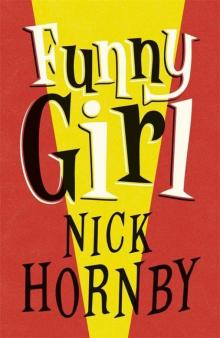 Funny Girl
Funny Girl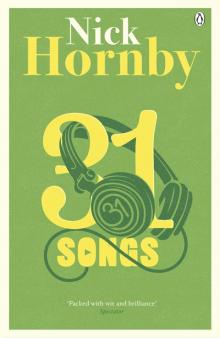 31 Songs
31 Songs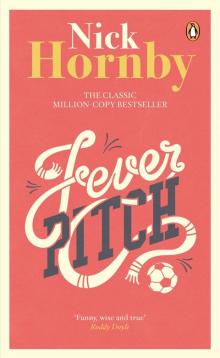 Fever Pitch
Fever Pitch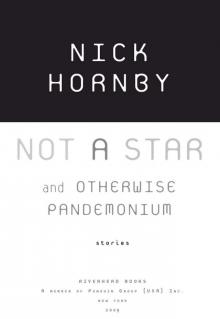 Not a Star and Otherwise Pandemonium
Not a Star and Otherwise Pandemonium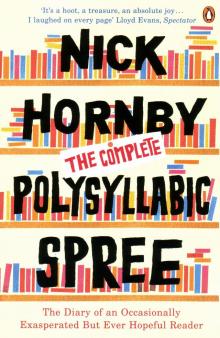 The Complete Polysyllabic Spree
The Complete Polysyllabic Spree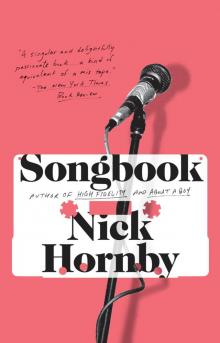 Songbook
Songbook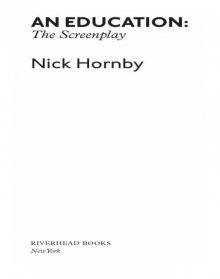 An Education
An Education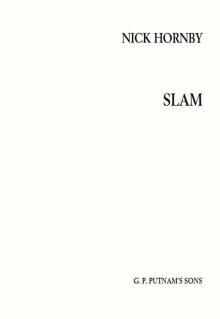 Slam
Slam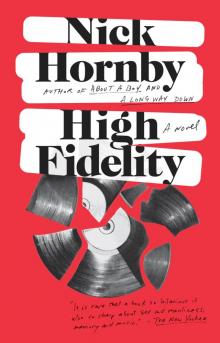 High Fidelity
High Fidelity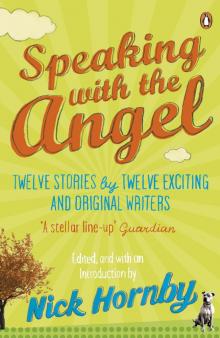 Speaking With the Angel
Speaking With the Angel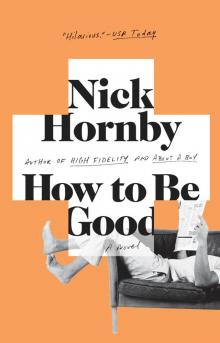 How to Be Good
How to Be Good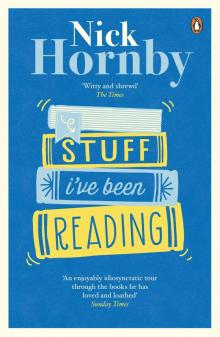 Stuff I've Been Reading
Stuff I've Been Reading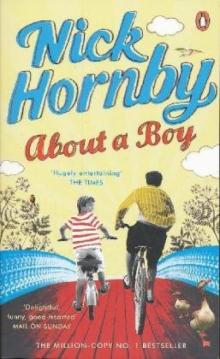 About a Boy
About a Boy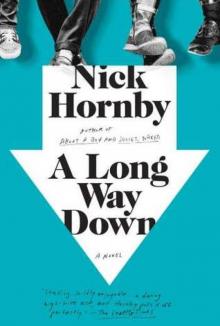 A Long Way Down
A Long Way Down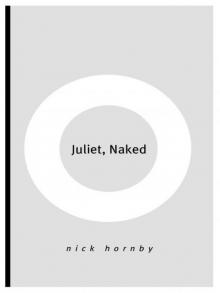 Juliet, Naked
Juliet, Naked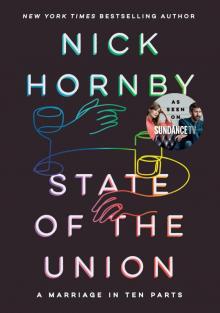 State of the Union
State of the Union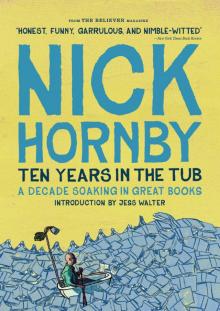 Ten Years in the Tub: A Decade Soaking in Great Books
Ten Years in the Tub: A Decade Soaking in Great Books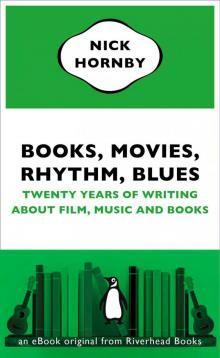 Books, Movies, Rhythm, Blues: Twenty Years of Writing About Film, Music and Books
Books, Movies, Rhythm, Blues: Twenty Years of Writing About Film, Music and Books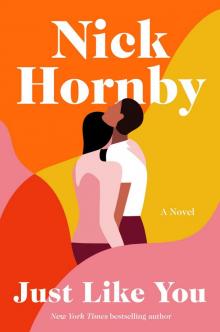 Just Like You
Just Like You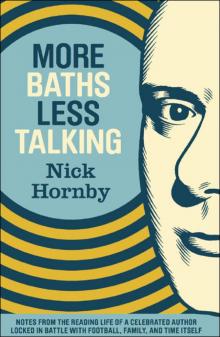 More Baths Less Talking
More Baths Less Talking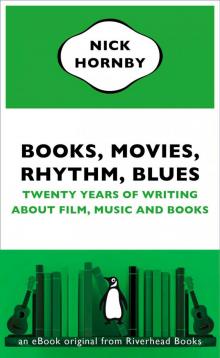 Books, Movies, Rhythm, Blues
Books, Movies, Rhythm, Blues